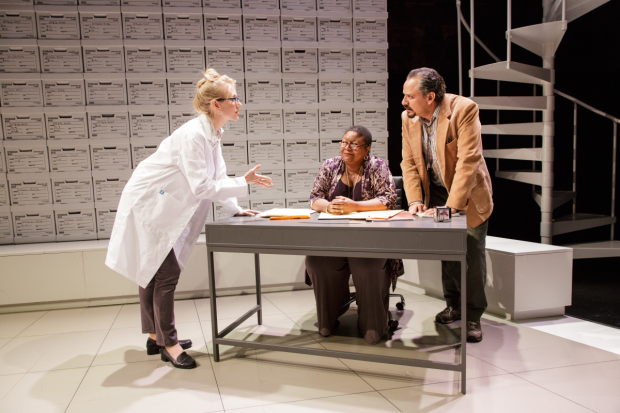Informed Consent

(© James Leynse)
You may feel a twinge of fear every time you click "accept" on the iTunes "terms and conditions," an avalanche of legalese one needs a law degree to decipher. You wonder, Did I just e-sign away my soul? At very least, you may have consented to have your data sold to a list of corporations interested in micro-targeting their next marketing push (data that can be resold ad infinitum). But you trust that you did not (despite your lack of properly "informed consent"), because you want to access Apple's many delightful products. Deborah Zoe Laufer's probing and thoughtful Informed Consent at the Duke on 42nd Street explores what happens when that trust is violated, with much higher stakes and graver consequences.
Laufer is not writing about the hurdles to buying the latest Taylor Swift album, but ethically dubious genetic studies performed on a tribe of American Indians. The playwright uses as her inspiration a landmark 2003 lawsuit the Havasupai tribe brought against Arizona State University concerning the use of their blood samples for unauthorized research. She retains the basics of that emotionally charged incident, punching up the details for dramatic effect.
Dr. Jillian Elliott (Tina Benko) is a genetic anthropologist studying human migratory patterns. "We're all cousins," she evangelizes, noting that the genetic differences between human beings are too slight to justify centuries of racism and millennia of tribalism. Race, she insists, is derived from migratory patterns, not genetics. "There's no such thing as 'white' people, really," says the white geneticist. As a person of color, her husband, Graham (Pun Bandhu), finds this sentiment a luxury he cannot afford.
Social anthropologist Ken (Jesse J. Perez) assigns Dr. Elliott to study the frighteningly high prevalence of diabetes in a tribe of 670 Native Americans living at the bottom of the Grand Canyon. Complicating matters, the tribe, which sees blood as sacred, is reluctant to have any drawn. Dr. Elliott convinces an influential daughter of the tribe, Arella (Delanna Studi), to promote the study in the hope that it will end the diabetes epidemic. Before taking the samples, however, Dr. Elliott has the tribe sign a vaguely worded consent form allowing her to perform other studies, including tracing the migratory history of the tribe. This flies in the face of the tribe's traditional origin story: that they sprang forth from the canyon. The tribe feels betrayed. Dean Hagan (Myra Lucretia Taylor) fears the inevitable lawsuit that could result from this breach of ethics.
In a breathtaking performance, Benko turns what could easily become a Dr. Frankenstein character into someone startlingly human, funny, and likable. What others perceive as her arrogance, we see as the stunted social skills of a gifted scientist. Her race against time — she is almost certain to die of early-onset Alzheimer's like her mother before her — gives her crusade a justifiable urgency.
Still, Studi lends a resonant and clear voice to the fears (and subsequent outrage) of Arella; it is hard not to also sympathize with her. Liesl Tommy deftly directs this balancing act, marshalling the five-person cast to strikingly detailed performances for a play in which roles and locations seem to shift with the wind.
Wilson Chin's set facilitates these rapid transitions with its open, trapezoidal playing space. Spiral staircases rise out of the four corners like minarets, giving Tommy many levels on which to work. The upstage wall is a cliff of file boxes, stacked to the rafters. Jeanette Oi-Suk Yew's well-curated projections appear all over the set, illuminating the more challenging aspects of the science at this story's core.
Laufer pays respect to the technical without getting too bogged down in it. As she showed with 2009's End Days, she knows her audience and how to challenge them to reexamine their preciously held beliefs. "Every tribe has its own truth," Arella says in a moment that would almost certainly cause Richard Dawkins to scoff. Certainly, if Laufer had written her play about a group of 670 Christian scientists holding fast to their faith while suffering from diabetes, the audience would not have been as receptive to their "truth." But when it comes to this tiny, vulnerable, and historically abused group of Native Americans, that "truth" gets a pass: How ever dubious it might be, it seems to be the only thing they have left.
And really, did Dr. Elliott do everything she could to inform her subjects of the rights they were signing away? Or, like so many modern corporations with purposely vague "terms and conditions," did she count on their ignorance and desperation as motivating factors? "Things are changing so fast," Dr. Elliott contends. "There's no way to fully represent what we might look for." One wonders if we can truly function as a society governed by laws when those laws are struggling to catch up to scientific research that is advancing at light speed.
On a deeper level, Informed Consent reflects the backlash of indignant unreason that has met those advances. Yes, the outrage is justified, undergirded by centuries of subjugation and betrayal; but in the end, it is still unreason. In trying to convince her husband to consider sequencing their daughter's DNA to see if she too is susceptible to Alzheimer's, Dr. Elliott asks, "Why should your fear be the thing that decides this?" For the time being, it seems that fear trumps logic. That is the most frightening story Laufer has to tell.










